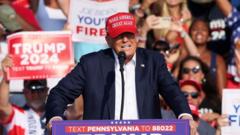Did Secret Service Suspend Staff Over Trump Assassination Attempt Failures?

Understanding the US Secret Service's Accountability Following Security Failures at Trump Rally
The recent revelations about the US Secret Service's response to security failings during a Trump rally have sparked significant discussions about accountability and operational protocols within one of the nation's most critical protective agencies. Six personnel have faced suspensions due to their roles in an incident where a gunman attempted to assassinate Donald Trump, highlighting both the gravity of the situation and the ongoing scrutiny the Secret Service is under. This article delves into the details surrounding the incident, the implications of the suspensions, and the broader context of security for high-profile political figures.
The Incident at the Butler Rally
On July 13, 2024, a rally in Butler, Pennsylvania, turned into a scene of chaos when a gunman, identified as Matthew Crooks, opened fire at then-presidential candidate Donald Trump. The attack resulted in the death of rally attendee Corey Comperatore and injuries to two others. Remarkably, one of Crooks's bullets grazed Trump's ear, necessitating an immediate evacuation of the candidate to ensure his safety. The tragic incident culminated in Crooks being shot dead by law enforcement.
Operational Failures Identified by the Secret Service
In the aftermath of the attack, Matt Quinn, the deputy director of the Secret Service, characterized the event as an "operational failure." This statement underscores the agency's acknowledgment of its shortcomings in ensuring the safety of a presidential candidate. Quinn confirmed that the penalties for the six personnel involved ranged from 10 to 42 days of unpaid leave, indicating the severity of the lapses that led to the attack.
Key Factors Leading to the Security Breach
The Senate and House investigations that followed the attack revealed multiple security lapses. A critical point of failure was the inadequate security measures employed to monitor the venue, particularly the failure to secure the rooftop from which Crooks fired. Such oversights are particularly concerning given the increasing threats faced by political figures in the current climate.
Improving Security Protocols
In response to the incident, Quinn has emphasized a need for systemic changes within the Secret Service. He stated that while accountability is essential, merely terminating personnel would not resolve the underlying issues. Instead, the agency has initiated several improvements, including:
- Implementing military-grade drones for enhanced surveillance.
- Establishing improved mobile command posts for agents in the field.
- Revising communication protocols to ensure rapid response during emergencies.
These changes aim to bolster the agency's ability to prevent similar incidents in the future while maintaining a high standard of protection for all political candidates, particularly those at risk of targeted attacks.
The Broader Implications of Security Failures
Security failures such as the one experienced at the Butler rally raise critical questions about the safety of political figures in the United States. The scrutiny faced by the Secret Service has intensified, especially in light of the Capitol riots and other violent incidents targeting politicians. The findings from the Senate and House reports highlighted that many of the issues identified remained unresolved months after the attack, raising concerns about the agency's responsiveness to threats.
Political Reactions and Accountability
In the wake of these revelations, the political landscape has reacted with a mix of concern and frustration. Congressional members have voiced their dissatisfaction with the Secret Service's handling of security, suggesting that a comprehensive review of the agency's protocols is necessary. The resignation of Kimberly Cheatle, the former director of the Secret Service, was a direct consequence of the criticism and scrutiny the agency faced.
Heightened Security for Political Figures
Following the Butler incident, Trump received increased levels of protection, which is atypical for presidential candidates. This escalation reflects the growing recognition of the threats posed to public figures. Moreover, the incident serves as a reminder of the vulnerabilities that exist even in seemingly secure environments. The need for constant vigilance and adaptability in security measures cannot be overstated.
Lessons Learned and Future Considerations
As the Secret Service reevaluates its operational protocols, several critical lessons emerge from the Butler incident:
- Proactive Threat Assessment: The importance of conducting thorough threat assessments before public events cannot be overstated. This includes evaluating potential vulnerabilities and implementing measures to mitigate risks.
- Robust Communication Systems: Effective communication among security personnel is vital for a coordinated response during emergencies. Ensuring that all team members are on the same page can significantly enhance situational awareness.
- Community Engagement: Engaging with local law enforcement and community members can provide additional layers of security and intelligence about potential threats.
Quinn's commitment to addressing the root causes of the security breach is a positive step forward. The agency must not only focus on immediate fixes but also cultivate a culture that prioritizes safety and accountability at all levels.
Conclusion: The Future of Security for Political Figures
The suspensions of the six personnel involved in the Butler incident represent a critical juncture for the US Secret Service. As the agency navigates the complexities of modern security threats, it must remain vigilant and adaptable to changing circumstances. The emphasis on accountability and operational improvement is essential in restoring public trust and ensuring the safety of political figures.
As we reflect on this incident, it is essential to consider how we can better protect our leaders while respecting the rights and safety of citizens. The future of political security in the United States requires a balanced approach that prioritizes both safety and transparency.
Frequently Asked Questions
What happened at the Butler rally involving Donald Trump?
At the Butler rally on July 13, 2024, a gunman named Matthew Crooks opened fire on Donald Trump, resulting in the death of rally attendee Corey Comperatore and injuries to two others. Trump was evacuated safely after being grazed by a bullet.
What actions were taken against Secret Service personnel after the incident?
Six personnel faced suspensions ranging from 10 to 42 days of unpaid leave due to their roles in the security failures that led to the attack. The agency acknowledged these lapses as operational failures.
What improvements are being made within the Secret Service following the attack?
The Secret Service is implementing several improvements, including the use of military-grade drones for surveillance, enhanced mobile command posts, and revised communication protocols to improve operational effectiveness during emergencies.
As we move forward, what additional steps do you think should be taken to ensure the safety of political figures in the United States? #SecretService #PoliticalSecurity #Accountability
Published: 2025-07-10 09:56:03 | Category: wales



